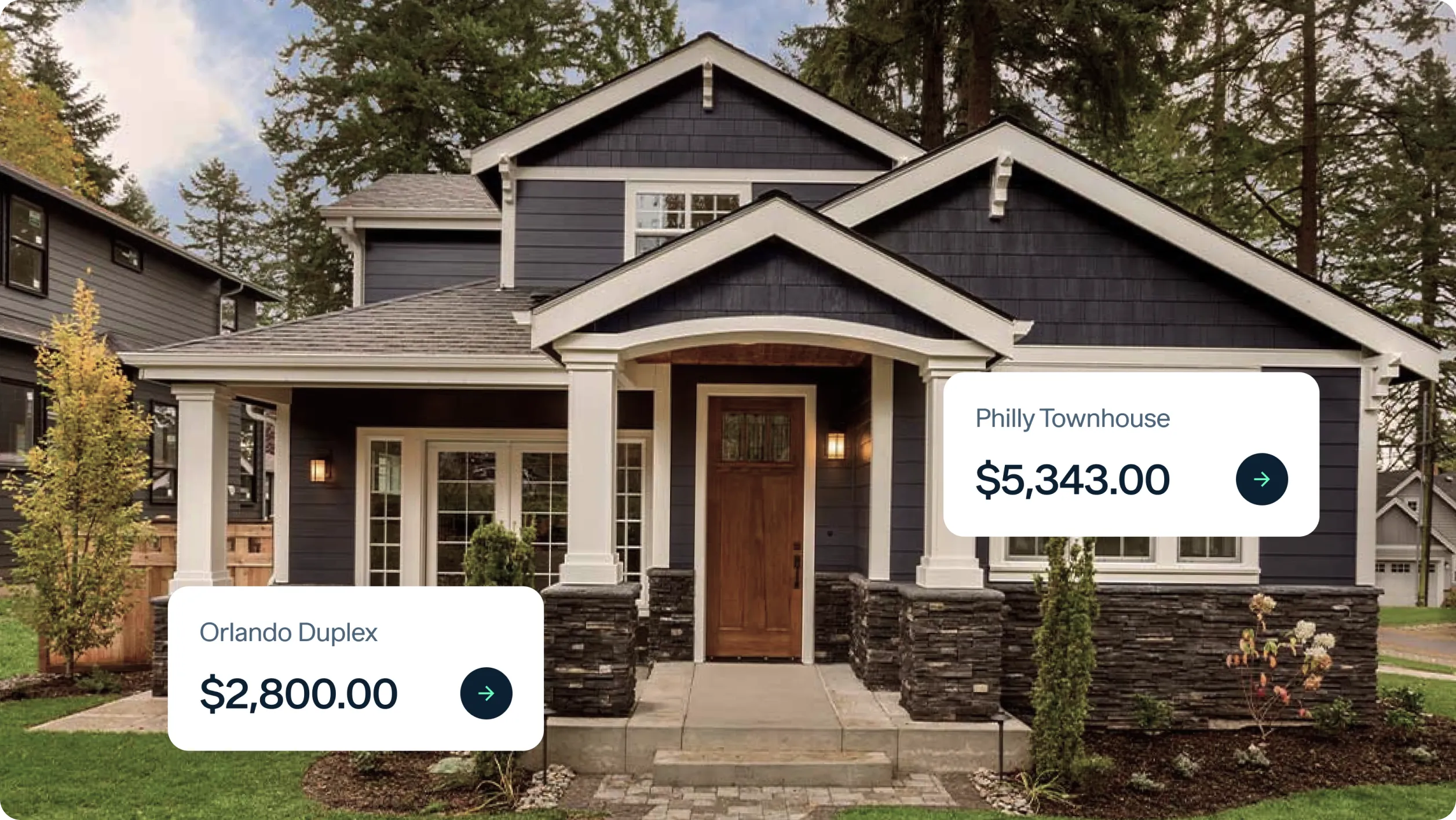Modern landlords constantly seek innovative ways to streamline operations, enhance security, and improve financial oversight. Virtual wallets, once primarily for personal spending, are now transforming how real estate investors manage their rental property finances.
Understanding this powerful digital tool can unlock new levels of efficiency and control for your rental business.
Key takeaways
- Banks with virtual wallets are a secure digital tool for managing financial transactions and information.
- It uses advanced technologies like encryption and tokenization for enhanced security.
- Landlords can leverage virtual wallets for faster rent collection, better expense tracking, and improved financial clarity.
- Dedicated landlord financial platforms incorporate virtual wallet functionalities, offering specialized tools.
- Adopting a virtual wallet bank leads to significant time savings and operational efficiency.
What is a virtual wallet?
A virtual wallet, also known as a digital wallet or e-wallet, is a software-based system that stores your payment information and allows you to make electronic transactions. This can include debit and credit card details, bank account numbers, and even digital cash.
These wallets exist on various devices, such as smartphones, tablets, or computers. They facilitate quick and secure payments both online and in physical stores. For a landlord, a virtual wallet can centralize financial data related to properties.
The technology behind virtual wallets
Virtual wallets rely on sophisticated technologies to ensure both functionality and security. These mechanisms protect your financial data during every transaction. Understanding them builds confidence in using these tools for your rental business.
Encryption
Encryption is a fundamental security feature in virtual wallets. It scrambles sensitive data, making it unreadable to unauthorized parties. This protects your financial information from cyber threats.
When you store card details or make a payment, encryption transforms the data into a secure code. Only authorized systems can decode this information. This ensures your financial details remain confidential.
Tokenization
Tokenization adds another layer of security by replacing your actual card number with a unique, randomly generated set of numbers called a "token." This token is meaningless if intercepted. It cannot be reverse-engineered to reveal your real card details.
When you make a transaction, the token is transmitted instead of your sensitive data. This greatly reduces the risk of fraud, even if a data breach occurs. Payments made through virtual wallets are tokenized and encrypted, significantly enhancing security and minimizing the risk of fraud.
Transmission
- Near Field Communication (NFC) allows devices to communicate wirelessly over short distances. This enables tap-to-pay functionality in stores.
- QR codes offer a quick payment method—you scan a code to initiate a transaction.
- Magnetic Secure Transmission (MST) mimics traditional credit card swipes, working with older payment terminals.
How virtual wallet transactions work
The steps are designed to be both fast and secure. This makes digital payments a reliable option for landlords managing multiple properties.
- Step 1: You link your bank accounts or credit cards to your virtual wallet. When making a payment, you select the desired funding source. For example, a landlord might choose a specific property's banking account.
- Step 2: The wallet encrypts your payment information and replaces it with a token. This token is then transmitted to the payment receiver. The payment network processes the token, authorizing the transaction without exposing your actual card details. Finally, a confirmation is sent back to your device.
Benefits of using a virtual wallet for landlords
For real estate investors, managing rental properties involves numerous financial transactions. Virtual wallets and integrated financial management platforms offer significant advantages. They address common pain points, such as payment delays, security concerns, and disorganized finances.
Streamlined & faster rent collection
Collecting rent can be a time-consuming process for landlords. Traditional methods like paper checks involve manual handling and slow processing times. Virtual wallets offer a modern solution.
Virtual wallets enable almost instant rent collection, reducing processing time from 7–10 days for traditional checks to just 1–2 days. This rapid transfer of funds improves cash flow management for property owners. Faster rent collection means quicker access to funds for expenses and investments.
Enhanced security & fraud protection
Security is paramount when handling rental income and expenses. Traditional payment methods can be vulnerable to fraud and theft. Virtual wallets provide robust protection.
As mentioned, payments made through virtual wallets are tokenized and encrypted.
This significantly enhances security and minimizes the risk of fraud. With this advanced security, landlords can have greater peace of mind knowing their financial data is protected.
Significant cost savings & operational efficiency
Managing rental properties involves various administrative tasks that can incur costs. Manual processes, such as tracking paper checks or reconciling statements, consume valuable time and resources. Virtual wallet saving accounts help reduce these burdens.
By automating rent collection and reducing reliance on paper checks, landlords can lower administrative and processing costs. This automation frees up time that can be reinvested into growing your portfolio or focusing on strategic decisions. It transforms operational efficiency for property management.
Improved tenant experience & satisfaction
Today's tenants expect convenience and modern payment options. Offering digital payment solutions can enhance their experience and satisfaction. This leads to more consistent on-time payments and fosters stronger landlord-tenant relationships.
Better financial control & real-time insights
Disorganized finances can hinder a landlord's ability to make informed decisions. Tracking income and expenses manually often leads to errors and delays in financial reporting. Virtual wallets offer a solution for greater clarity.
Virtual wallets facilitate automated receipts, reminders, and recurring rent processing, saving landlords time and providing tenants with transparent payment records. This automation provides real-time insights into cash flow and expenses, giving you a clear picture of your property’s financial performance.
Features to look for in a landlord-specific financial management platform
While general virtual wallet apps are useful, real estate banks designed specifically for landlords often integrate virtual wallet functionalities with a broader suite of property management tools.
These integrated solutions are tailored to the unique needs of real estate investors. They provide a comprehensive approach to managing your rental business finances.
Automated rent collection
A key feature of these platforms is automated rent collection. This allows landlords to set up recurring rent invoices and payment reminders. Tenants can then pay conveniently through a dedicated portal.
This automation significantly reduces the time and effort required to chase payments. It also ensures consistent cash flow. For landlords looking to leverage modern financial solutions, a platform supporting landlord digital banking streamlines the entire rent collection process.
Integrated bookkeeping & accounting
Comprehensive financial platforms offer robust bookkeeping and accounting features. They automatically categorize transactions by property and expense type. This eliminates manual data entry and reduces errors.
This integration simplifies the tracking of income and expenses, providing a consolidated ledger of all transactions. For proper financial oversight, maintaining a dedicated bank account for each rental property simplifies bookkeeping. Baselane, for example, offers auto-categorized transactions and generates essential tax reports like Schedule E.
Dedicated tenant portals
Tenant portals enhance communication and streamline interactions. Tenants can use these portals to make payments, submit maintenance requests, and access lease documents. This creates a centralized hub for all tenant-related activities.
For landlords, these portals reduce direct inquiries and administrative burden. They offer tenants a convenient and transparent way to manage their rental obligations. This improves overall tenant satisfaction and engagement.
Automated expense tracking & categorization
Managing expenses is critical for accurate financial reporting and tax preparation. Landlord-specific platforms automate the tracking and categorization of every transaction. This ensures that no expense is overlooked.
They often use AI to suggest categories based on past spending patterns. This feature saves significant time during tax season. You gain clear visibility into where your money is going for each property.
Comprehensive financial reporting
Understanding your property's financial performance requires detailed reports. These platforms generate various financial statements automatically. This includes Profit & Loss statements, Cash Flow reports, and more.
Common features of landlord financial management platforms include automated rent collection, integrated bookkeeping and accounting, tenant portals, and comprehensive financial reporting for tax purposes (e.g., Schedule E, 1099s). These reports provide real-time insights into your properties' profitability and cash flow. This empowers landlords to make data-driven decisions.
Document & lease management
Storing and managing important documents can be challenging for landlords. Integrated platforms offer secure digital storage for leases, tenant agreements, and other essential paperwork. This ensures easy access and organization.
You can upload and organize all your property-related documents in one place. This reduces clutter and the risk of losing important papers. It simplifies auditing and legal compliance.
Integrated tenant screening
Tenant screening is a crucial step in finding reliable renters. Many landlord platforms integrate screening services directly. This allows you to run credit checks, background checks, and eviction history reports.
This integrated approach streamlines the tenant application process. It helps landlords make informed decisions about prospective tenants. This feature is vital for protecting your investment and ensuring a stable rental income.
How to use virtual wallets for your rental business
Beyond basic rent collection, virtual wallets and integrated platforms offer numerous practical applications for landlords. They can transform how you manage security deposits, handle business expenses, and even optimize earnings from short-term rentals. These tools provide comprehensive financial solutions tailored for property owners.
Collect rent payments
Using a virtual wallet-enabled platform for rent collection is highly efficient. You can send automated invoices and reminders directly to tenants. They can then pay securely from their digital wallets or bank accounts.
This method significantly reduces late payments and administrative work. It provides both landlords and tenants with clear records of all transactions. For certain situations, understanding reasons to put rent in escrow can offer additional payment security or dispute resolution mechanisms.
Collect and manage security deposits
Managing security deposits involves specific legal requirements and financial best practices. Virtual wallet functionalities within landlord platforms can simplify this complex task. They help ensure compliance and proper handling of funds.
Understanding a landlord security deposit is crucial. Platforms allow you to allocate separate virtual accounts for security deposits, keeping them distinct from operating funds. This helps in understanding how security deposits work and maintaining clear financial separation.
Many states require security deposits to be held in separate accounts or escrow accounts. Knowing how to set up an escrow account is therefore essential. Some states also mandate that landlords pay tenant deposit interest.
Baselane banking accounts enable you to create an unlimited number of virtual accounts, ideal for segregating security deposits. You can also monitor if escrow accounts earn interest within compliant accounts. This ensures you're ready to return deposits according to regulations, regardless of how much a security deposit is usually.
Organize personal and business finances
Maintaining clear boundaries between personal and business finances is vital for landlords. It simplifies bookkeeping, tax preparation, and financial analysis. Virtual wallets integrated with dedicated banking solutions make this separation seamless.
You can set up distinct virtual accounts for each property or for different categories of expenses.
Understanding the differences between a business checking vs. personal account is a foundational step for any serious real estate investor.
Streamline vendor and contractor payments
Paying vendors and contractors can also be streamlined with virtual wallet features. You can set up recurring payments for utilities, maintenance, or property management fees. This ensures timely disbursements and maintains good relationships with your service providers.
Some platforms offer virtual debit cards, allowing landlords to control spending limits for each vendor. This adds an extra layer of security and oversight for property-related expenses. Automated payment tracking simplifies reconciliation at the end of the month.
Leverage for short-term rentals
For landlords managing short-term rentals like Airbnb properties, virtual wallets offer unique advantages. They can help manage fluctuating income, cleaning fees, and guest-related expenses. Tracking cash flow for each short-term rental unit becomes significantly easier.
Platforms designed for landlords can integrate with popular short-term rental booking sites.
This allows for automated income reconciliation and expense tracking specific to each listing. For owners of short-term rentals, having a dedicated Airbnb bank account provides clear financial segregation.
Optimizing savings with high-yield accounts
Many modern landlord financial platforms integrate high-yield savings account options. This allows landlords to earn more on their reserves and security deposits. Instead of letting funds sit in low-interest accounts, you can grow your capital.
These integrated savings accounts offer competitive Annual Percentage Yield (APY) rates. This helps maximize passive income from your rental business. To find platforms offering the best high-yield online savings accounts tailored for rental property owners, research providers carefully. Learn how to set up high-yield savings accounts within a platform like Baselane to start earning more on your funds.
The future of digital payments in real estate
The trend towards digital payments and virtual wallets in real estate is set to accelerate. As technology evolves, landlords can expect even more sophisticated tools for financial management. This includes greater automation, enhanced predictive analytics, and deeper integration with other property management services.
The goal is to create a seamless ecosystem where all aspects of property finances are effortlessly managed. This will allow landlords to spend less time on administrative tasks. Instead, they can focus on what truly matters: growing their real estate portfolios and maximizing their returns.
Bottom line
Virtual wallets, especially when integrated into specialized financial platforms, offer landlords an unparalleled opportunity to modernize their operations.
From lightning-fast rent collection to secure expense tracking and comprehensive financial reporting, these tools provide the clarity and control you need. Embrace the power of digital finance to take back time, gain clarity and control, and grow your passive income.
Discover how Baselane empowers landlords with a unified financial platform designed to streamline your banking, bookkeeping, and rent collection. Create a free account today and experience the future of rental property management.
FAQs
What is a virtual wallet for landlords?
A virtual wallet for landlords is a digital tool, often integrated within a financial management platform, that allows property owners to securely manage income, track expenses, and process payments for their rental properties using digital technologies like encryption and tokenization.
How does a virtual wallet enhance rent collection?
Virtual wallets enable faster rent collection by facilitating direct digital payments from tenants, often reducing processing times from days to hours. They also automate invoicing, reminders, and payment tracking, streamlining the entire process for landlords.
Are virtual wallets secure for handling rental income?
Yes, virtual wallets use advanced security features like encryption and tokenization to protect sensitive financial data. This means your actual bank account or card details are masked during transactions, significantly reducing the risk of fraud or data breaches.
Can a virtual wallet help with tax preparation for landlords?
Many landlord-specific financial platforms with virtual wallet functionalities include robust bookkeeping and reporting tools. They can auto-categorize transactions and generate essential tax reports like Schedule E, making tax preparation much easier and more accurate.
What distinguishes a landlord-specific virtual wallet from a general one?
A landlord-specific virtual wallet or financial platform is tailored to real estate needs, offering features like dedicated banking accounts per property, automated rent collection, integrated bookkeeping, and tax reporting unique to rental businesses, unlike general consumer virtual wallets.

















